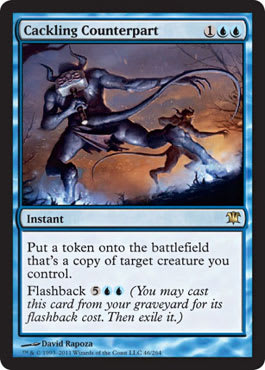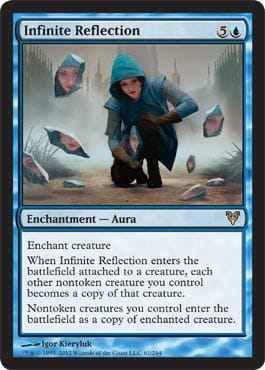I was discussing Gatecrash previews with a friend this week, and I brought up my fondness for Biovisionary. I thought it would be fun to win with that card in Standard, and I mentioned that it might be possible using Cackling Counterpart and Clone, though you'd definitely need some luck as well. He then brought up an option I hadn't considered: Infinite Reflection. My mind immediately started running full speed ahead. You'd need to have three other creatures in addition to a Biovisionary . . . Mana dorks would work, and they'd help you reach that 6-mana mark faster. Searing Spear is a problem, but you can wait until your opponent taps out, and you can throw in a few Dispels in case he doesn't. After some further thought and a good bit of fiddling, here's the list I came up with:
"Infinite Biovisionaries"
- Creatures (25)
- 2 Gatecreeper Vine
- 3 Mayor of Avabruck
- 4 Arbor Elf
- 4 Axebane Guardian
- 4 Biovisionary
- 4 Clone
- 4 Fog Bank
- Spells (11)
- 3 Dispel
- 4 Cackling Counterpart
- 4 Infinite Reflection
- Lands (24)
- 7 Island
- 9 Forest
- 4 Evolving Wilds
- 4 Simic Guildgate
- Sideboard (15)
- 4 Unsummon
- 4 Tormod's Crypt
- 4 Amass the Components
- 3 Pithing Needle
The Combo Pieces
 Biovisionary is the new guy on the block, a Simic rare that's essentially a Blind Phantasm . . . until the turn it isn't. Once you've collected four copies of this unassuming creature, you win the game. That's it. It's over. You don't even have to wait until your next upkeep, since Biovisionary triggers at the beginning of the end step instead. The hard part, of course, is putting those four copies onto the battlefield.
Biovisionary is the new guy on the block, a Simic rare that's essentially a Blind Phantasm . . . until the turn it isn't. Once you've collected four copies of this unassuming creature, you win the game. That's it. It's over. You don't even have to wait until your next upkeep, since Biovisionary triggers at the beginning of the end step instead. The hard part, of course, is putting those four copies onto the battlefield.
Infinite Reflection turns all your creatures into Biovisionary. That means if you have a total of four creatures, congratulations, you get to win the game now. Standard is mostly operating at sorcery speed at the moment, and many decks don't have any way of stopping this combo. That means that this silly deck can often crush opponents wielding powerful cards such as Thragtusk and Restoration Angel.
Although Cackling Counterpart can only copy creatures you control, it more than makes up for that with its 3-mana cost and the flashback ability. Since you're already planning on making it to at least 6 mana for Infinite Reflection, 7 isn't much of a stretch. That means that drawing a single Cackling Counterpart will often give you two more copies of Biovisionary, leaving you with only one to go before you win.
Clone is . . . Well, it's Clone, and it’s the best we have at the moment. Although we've been spoiled recently by the likes of Phantasmal Image and Phyrexian Metamorph, good old Clone still does the job, and 1 extra mana isn't too much to pay for another copy of Biovisionary.
The Support
Arbor Elf is a quick and easy 1-drop that can accelerate you into a turn-two Biovisionary or Axebane Guardian. Although turn-four wins won't happen particularly often, Arbor Elf is the key to making them possible. It not only gives you extra mana to work with, it's especially important in this deck as a cheap creature that you can turn into a Biovisionary later.
Axebane Guardian costs much more mana than Arbor Elf, but it provides a helpful blocker when you're not using it, and it will often boost your mana production by more than just 1. Although the deck isn't overflowing with defenders, it does have enough that Axebane Guardian will be making 2 mana more often than not.
Gatecreeper Vine doesn't block as well as Axebane Guardian, but it does go a long way toward putting you to 6 mana. It gives you another defender on the field for the Guardian and searches up a land in case you don't have enough to hit all of your land drops.
Fog Bank gives you an excellent defense against creatures of any size, from Rakdos Cacklers, to Thragtusks, to double-striking Wolfir Silverhearts. It will help keep you alive while you put your combo together, and at 2 mana, it curves nicely into Axebane Guardian to kick-start your mana.
Mayor of Avabruck provides a secondary target for your Clone effects. Or more accurately, Howlpack Alpha does. Although any Wolf tokens you make can't be morphed by Infinite Reflection, a Clone of Howlpack Alpha can never be forced to transform back into Mayor of Avabruck since it isn't a double-faced card. With just two copies of Howlpack Alpha on the board, the original and a Clone, you'll be pumping out a pair of 4/4 Wolf tokens every turn. Although transforming Mayor of Avabruck may seem like a chore, keep in mind that Cackling Counterpart is an instant. This means you can end your turn without casting any spells, transform the Mayor, and immediately copy it with Cackling Counterpart on your opponent's turn.
Dispel helps protect your combo against disruption like counterspells and Searing Spear. If all goes well, your opponent won't ever have a turn to react, meaning that instants are the only cards that can cause you trouble when you're about to go off. Dispel easily counters all of them for only a single blue mana, meaning you don't have to make it all the way to 8 or 9 to have that bit of extra insurance for your Infinite Reflection.
The Sideboard
Tormod's Crypt is back again to buy you time against the more prominent graveyard-based decks in the format. When playing with free spells like this, remember that you don't have to cast them on your first turn. In fact, it's usually better to wait until just before your opponent might be ready to go off, giving you maximum impact if he has an artifact-destruction spell in hand to force you to activate the Crypt prematurely.
Unsummon can buy you some extra time against aggressive strategies if you need it, making sure you don't take 20 damage before you can cast Infinite Reflection. In a pinch, it can even be used to save a Biovisionary from removal if you don't have a copy yet.
Amass the Components helps immensely against control, against which you don't necessarily want a Fog Bank in your hand. What you do want, however, is more Biovisionaries, more Infinite Reflections, and more Dispels. Amass the Components is excellent at helping you find them.
Pithing Needle gives you an answer to planeswalkers, which this deck often has difficulty dealing with through normal means. Although you will often be able to combo off before a planeswalker becomes a real threat, it's good to have some insurance just in case you get off to a slower start.
Playtesting
Naya Midrange – Game 1
 I won the roll and kept a hand of two Islands, a Forest, Evolving Wilds, Arbor Elf, Fog Bank, and Biovisionary. I started off by playing my Forest and cast Arbor Elf, and my opponent played a tapped Rootbound Crag and passed the turn.
I won the roll and kept a hand of two Islands, a Forest, Evolving Wilds, Arbor Elf, Fog Bank, and Biovisionary. I started off by playing my Forest and cast Arbor Elf, and my opponent played a tapped Rootbound Crag and passed the turn.
I drew Clone, played an Island, and cast Biovisionary before ending my turn. My opponent played a Plains, cast Avacyn's Pilgrim, and passed back.
I drew an Island, played it, and Cloned my Biovisionary. I attacked for 2 and ended my turn. My opponent played Sunpetal Grove and cast Huntmaster of the Fells, making a token and going back up to 20. He ended his turn.
I drew Cackling Counterpart and cast it, making a copy of Biovisionary. I played Evolving Wilds, sacrificing it for a Forest, and passed the turn. My opponent cast Borderland Ranger, finding a Mountain, and Avacyn's Pilgrim.
He ended his turn, and I drew Simic Guildgate. I played it, cast Fog Bank, and ended my turn. My opponent cast Angel of Serenity, exiling my three Biovisionaries. He attacked with Huntmaster of the Fells and Borderland Ranger, and I took 2 after blocking with Fog Bank. He ended his turn.
I drew Cackling Counterpart, played my Island, and flashed back the copy in my graveyard, making a Fog Bank. I passed the turn. My opponent attacked with everything. The Fog Banks blocked the larger creatures, and I dropped to 14. He then played a Loxodon Smiter and ended his turn.
I drew Arbor Elf, played it, and passed. My opponent cast a Bonfire of the Damned for 6 as a miracle, and that ended it.
Sideboarding:
−3 Dispel
+4 Unsummon
Game 2
I kept a hand of two Islands, a Forest, Evolving Wilds, Biovisionary, Fog Bank, and Cackling Counterpart. I played the Evolving Wilds, sacrificed it for a Forest, and passed the turn. My opponent played a tapped Temple Garden and passed back.
I drew an Island, played it, and cast Fog Bank. I ended my turn. My opponent played a Rootbound Crag and cast Farseek, finding a Temple Garden.
He passed the turn, and I drew Evolving Wilds. I played an Island, cast Biovisionary, and passed back. My opponent played Kessig Wolf Run and cast Huntmaster of the Fells. He went to 22, made a Wolf, and ended his turn.
I drew Mayor of Avabruck, played Evolving Wilds, sacrificing it for an Island, and cast Cackling Counterpart on Biovisionary. I ended my turn. My opponent attacked with both creatures, dropping me to 18 after Fog Bank soaked up some damage. He played a land and cast Thragtusk, gaining 5 life, and passed the turn.
I drew Clone, cast it on Biovisionary, then played my Forest and passed the turn. My opponent played Sunpetal Grove and attacked with everything. Fog Bank blocked 2 damage, and after a pump from Kessig Wolf Run, I dropped down to 8.
Huntmaster of the Fells transformed, killing my Fog Bank and dropping me to 6. Fortunately, I drew Cackling Counterpart and made a fourth Biovisionary to win the game.
Game 3
I kept a hand of two Islands, Unsummon, Fog Bank, Mayor of Avabruck, Clone, and Biovisionary. My opponent started off by paying 2 life for Temple Garden and casting Avacyn's Pilgrim. I drew Cackling Counterpart, played my Island, and passed the turn.
My opponent played a Sunpetal Grove, attacked for 1, and passed back. I drew Infinite Reflection, played my Island, and cast Fog Bank. I ended my turn.
My opponent played a Plains and passed. I drew an Island, played it, and ended my turn.
My opponent played Sunpetal Grove and cast Thragtusk, gaining 5 life. He passed the turn, and I drew a Forest. I played it and cast Biovisionary before passing the turn.
My opponent cast another Thragtusk, going up to 28, and passed the turn. I cast Clone on my opponent's Thragtusk, gaining 5 life for myself.
My opponent attacked with his Thragtusks. Fog Bank blocked one, and the other took me back down to 20. He passed the turn. I drew Arbor Elf, cast it, and ended my turn.
My opponent cast Restoration Angel, targeting his Thragtusk. I cast Unsummon on it in response. He attacked with the Angel, the Beast token, and the remaining Thragtusk. Fog Bank blocked Thragtusk, and I took 6 from the other creatures. He cast Thragtusk again, gaining 5, and passed the turn. I drew Simic Guildgate, played it, and passed the turn.
My opponent attacked with everything save Avacyn's Pilgrim. Fog Bank blocked a Thragtusk, and I dropped to 6. My opponent cast two Farseeks and ended his turn. I untapped and cast Infinite Reflection on Biovisionary, turning my other three creatures into copies of it. I ended my turn and won the game.
Wrap-Up
Although this deck is rather vulnerable to sweepers and removal, it can be surprisingly effective, especially against decks without many ways to get rid of Biovisionary. It also definitely has a surprise factor that can help you prevail over opponents who aren't familiar with the deck. After all, who's going to bother leaving up mana for removal when you only have a single Biovisionary? This deck is definitely a ton of fun, and if you like combo decks and offbeat strategies, take it for a spin once Gatecrash is released.
As always, if you have any questions or comments, you can find me on the forums under Twinblaze, on Twitter under @Twinblaze2, or simply leave a comment below.


























